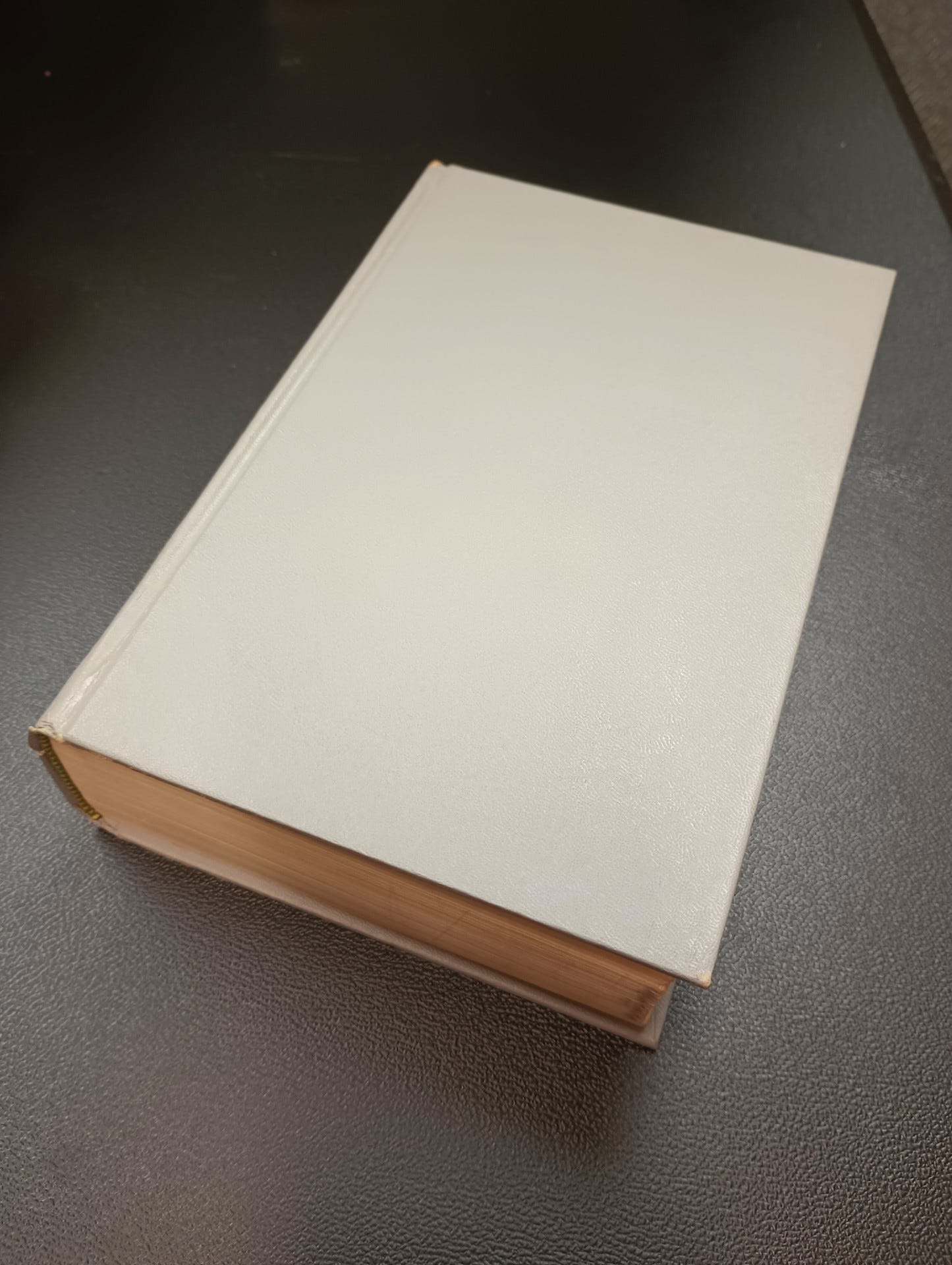The Kafkaesque World of Banned Books
Empowering Corporate Bureaucracy, One Dumb Step at a Time
In September I wrote for First Things about “The Orwellian Evolution of Banned Books Week,” a promotion showcasing the book industry’s most-recommended, most highly promoted books, presented as threatened or difficult to access: victim culture as an ad campaign. I noted that there were plenty of books that never make it into anyone’s Banned Books Week Promotion – which is what we call it in the industry – which are much harder to access. Amazon, the single biggest player in book retail, doesn’t ban industry favorites like To Kill a Mockingbird, but does have a list of forbidden books, and seems to be tinkering with its content-moderation powers.
The banned books are often unsavory – Protocols of the Elders of Zion kind of stuff – but all kinds of things can get swept up when you start banning books. One of the books Amazon banned on me was a University of Kentucky edition of The Clansman: An Historical Romance of the Ku Klux Klan. This was printed as part of the University of Kentucky’s series “The Novel as American Social History,” a critical edition for study of one of the central texts of Lost Cause ideology. The book is the inspiration for the movie The Birth of a Nation, often shown in film history courses as one of the groundbreaking works of cinema. The book supports precisely the kind of thoughtful study which the American Library Association’s Freedom to Read Statement insists we need to have to combat bad ideas. Amazon is willing to say this kind of thing should not be allowed and they are willing to use their power in the market to prevent a bookseller like me from trying to sell it. This should alarm lovers of freedom of the press much more than some chimerical threat to The Bluest Eye.
Amazon is a vast selling platform, which assures 1) that its content moderation will be significant for book availability and 2) that it will be incompetent. It’s too big to not fail: it doesn’t know what it doesn’t know. I noted that they blocked me from selling a “Wild Orchid” journal, because they thought it was a real orchid rather than a journal with a design on the cover. Other books they told me were restricted are currently being sold by other sellers – I don’t know if they have reversed their decision on the book or are just enforcing it irregularly. This is another aspect of content moderation, the Kafkaesque wrestling with an uninformed, unaccountable bureaucracy over which we have no power.
Just a day after the Banned Books Week piece got published, Amazon sent me an email telling me I had yet another “restricted product:” a Signet Classics copy of The Scarlet Letter, by Nathaniel Hawthorne. I have no idea why they determined this book violated their “community standards,” but I decided that was not the day I would fight with someone over a four dollar paperback. It’s far more likely to sell in my store than online anyway. This wasn’t even a controversial case: of course The Scarlet Letter shouldn’t be restricted. They’ll figure it out.
A few hours later they sent me another email: an old short story book we had, entitled Stories To Remember, had, after five years on sale in our store, had just now been identified as a “restricted product.” This was apparently an even more dire situation. An hour later they sent me another email reiterating that the book was a restricted product. Two hours later came another email, and an hour later there was one more. Emails came every hour for the next two days, before I decided that I was going to take an interest in this case.
I pulled the book off the shelf. It was an old hardback, published by Doubleday, a reputable mainstream publisher, in 1956. It had some good stuff in it: the first chapter of David Copperfield, “I Am Born” (love that title!). “The Pope’s Mule” by Daudet. “The Legend of Sleepy Hollow,” which you know I love. “The Gift of the Magi,” by O. Henry. Standards. I wasn’t going to read it all. Seemed fine to me. I went back to the most recent of Amazon’s fifty emails to me on this topic. There was a relevant heading, which I read:
Why is this happening?
Customers trust that they can always buy with confidence on Amazon. The sale of illegal, unsafe, or other restricted products is strictly prohibited. Although Amazon is undertaking this review, you are responsible for ensuring that the products you offer comply with all applicable laws, regulations, and Amazon’s policies.
I looked for the book on Amazon. Other people had it for sale, no particular problems. All right, I thought, I’m going to complain about this one. I opened up a “case” and told them this was a book of short stories by (mostly) reputable authors, from a (mostly) reputable publisher; I saw no reason for it to be a restricted product; other sellers had the item for sale on Amazon too. Someone or something named Gurjot wrote back to me with links for Amazon policies on restricted products and said they would do a review of this product.
They wrote to me the next day:
Hello from Amazon,
We are writing to let you know that the following detail pages have been removed from our catalog:
ASIN: B000HN6HQG, SKU: 46305, Title: Stories to Remember (Vol. 1)
This product has been identified as a muzzleloader or other black powder gun which is prohibited to be sold on Amazon.
I had to laugh. They normally liked muzzles. Glad to see their review process works so well.
Do you think this is absurd? Do you think this is how I should be spending my time? If you think this is silly, you can remedy the situation: don’t use Amazon. For books you need from faraway places use Biblio, the one independent bookselling platform left. We have our books there 20% cheaper than Amazon (we jack up our prices on Amazon because we’d rather sell a book elsewhere, and to cover the time we spend on idiocy coming from them). Even better, buy local. Don’t give corporate bureaucracy your money and our power. Find someone who’s providing something you like nearby, and patronize the hell out of them.
Last week Amazon pulled another product, and we went through the same process. This time it was Southern Pacific Narrow Gauge Locomotives and Freight Equipment by Robert Bader. After their review process, they wrote to me:
This product has been identified as a prohibited audio surveillance device. Amazon policy prohibits the sale or listing of devices that can be used to secretly intercept or record wire, oral, or electronic communications (i.e., eavesdropping or wiretapping). For more information, please see our Surveillance Equipment Seller Help Page.
I was impressed. I thought these people liked surveillance. I presume it’s just competition in the surveillance business they dislike.







I think that we might look to AI as the cause of many problems such as that with Stories to Remember as related by John. The same could be said for the rapid and incomprehensible fluctuations in the prices of books and other items perhaps.
As far as Birth of a Nation is concerned, it would better be titled Birth of the Ku Klux Klan, or a license to Jim Crow and the abuse and lynching of countless innocent black people. However, I do understand John’s point. Censorship deprives us of the opportunity to understand even things we don’t agree with. We should try to understand the roots of white supremacy, and who better to start with than white supremacists themselves, and their victims?
As a white person I should know these things. We might also compare something like the ever expanding evidence and charges of mass sexual abuse of children in the Catholic Church. I bring this example because as a Catholic convert for fourteen years now this issue has grieved me greatly. I continue to hold to my faith. Nevertheless, I want and need to understand how thousands, if not tens of thousands of priests have abused children in their flocks over hundreds of years? Also, the estates of many convents and schools for indigenous children have been excavated revealing the unmarked graves of hundreds of babies and young women whose lives and stories have been lost. I want to understand how this has happened. And, since we are speaking of Kafkaesque socio-bureaucracy, how could the Catholic Church have known about these crimes and systematically covered them up, even transferring the offenders to new flocks? Just as with white supremacy, I want these things to be investigated, documented and published for all, even if they are inconvenient truths for many.
So, I agree with and fully support the spirit of this article. Transparency benefits all in the end.
Insanity